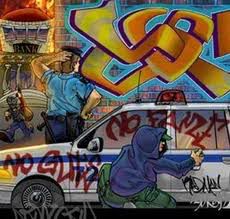
A Singapore court on Wednesday extended a jail term for a Swiss man by two months to seven and maintained an earlier ruling that he receives three strokes of the cane for trespassing and spray-painting graffiti on a train. …"It is conduct which is entirely unacceptable in Singapore, regardless of the artistic merit (or lack thereof) of the graffiti," the judge said in a written statement.
Singapore is, of course, famous for hanging drug dealers, fining litterers and outlawing chewing gum. I don't want to think about the penalty for littering while chewing gum.
Like almost everyone raised in a modern Western society, I cringe a little when reading about stuff like that. Inhumane. Disproportionate.
It results in what I understand (never having been there) is a safe, spotless city-state. At too high a cost in regimentation and sterility, though.
Nevertheless, in some twisted part of my being, I get a thrill out of the thought of a graffiti "artist" being whacked with a cane on the backside where his brains are located. Graffiti is — are? — an eyesore in parts of American cities, and it's worse (worse, I tell you!) in Europe. Highway overpasses are one thing, but to see centuries-old, architecturally magnificent buildings covered with cretinous scrawls all around the ground floor enrages me.
In Italian cities, full of historic buildings, sometimes the only one not vandalized is the Questura (police) headquarters. Occasionally a brave graffitist will even leave his tag there.
Young people go through a normal rebellious stage, and up to a point we need to be understanding and tolerant. But I have read that graffiti painters are mostly gang members who belong to a sort of guild, even traveling from city to city to leave their handiwork. That isn't animal spirits. It's an anti-social declaration of war against civic order and beauty.
Are there worse things to be concerned about? Sure, but some of the worse things have their roots in egotistic behavior of the graffitists. The "broken windows" model of social breakdown: a sign that the bond between citizens and their environment has snapped. Cities, like people, can lose their self-respect, allow themselves to be abused. And that leads to further abuse.
Perhaps because Singapore is the world's only important remaining city-state, it won't put up with degrading the stage whereon its life is enacted. Does it make its point too harshly? Yes, I think so. But at least it makes the point. I wish more places did.




5 comments:
I was surprised when I went to Europe the first time to see all the graffiti. And it's exactly the same style as you see here in the US, even the riff-raff are globalized.
Singapore is too lenient. A first-class hanging at Raffles Place is what I want!
I endured two years in Singapore; my take on it is a slight twist on JFK's maxim on Washington, D.C. (southern efficiency and northern charm) - Singapore has the exotic charm of a third-rate western mall and the efficiency of the of the U.S. public school system.
I, too, heeded the warnings about chewing gum and jaywalking - and our first morning there, my husband watched, en route to work, as a cab driver pulled over on a main thoroughfare and took a piss on the sidewalk. I learned that the elevators had urine sensors because all the local men pee in them. The public toilets have to be automatic flush because no local would bother to do so manually. Chinese female office workers march around the sidewalk arm in arm, casually dropping their trash as they go. If you are in any way less than fully mobile (or have a stroller with you) you confront flights of stairs up and down to every shopping center, apartment building, and hotel in town. There is no such thing as a handicapped ramp. The "modern" grocery stores have the fetid reek of fish and rotting food (and of course, the locals adore the vile Durian melon).
Singapore's draconian stance on drugs only applies within city limits. They show no interest in interdicting, let alone stopping, the drug couriers who transit Changi airport. U.S. customs and DEA get no cooperation in this (business is business, after all).
Singapore's laws do sound draconian and effective, and whenever a foreigner is caught and caned, the western press is in full-throated cry. These measures were not instituted out of a sense of public virtue or moral rectitude, however, but out of the ruling PAP's (People's Action Party) need to control (and attempt to modify) traditional Chinese behavior and observation of the rule of law (i.e. evasion).
I am hardly wracked with pity for the average Singaporean's lack of political rights; I merely want to correct the widespread misapprehension that well, it's authoritarian but at least the trains run on time. No, it's not particularly efficient (it only looks good compared to the wretchedness of the rest of Southeast Asia), and the authorities' entire motivation is to maintain complete control over the social, economic, and political system. If this control in any way improves the lot of the average Singaporean, that's all to the better - I'm not saying the government is actively trying to impoverish its people (quite the opposite). However, the only ones who truly succeed economically are the elite, just as in most third world countries, and Singapore's western facade is a bright and shining lie. Yes, it's in general a benevolent dictatorship, but truly efficient it is not.
Sheila,
Thanks for talking about your own experience of Singapore, very different from the image its tourism and business promotion organizations cultivate.
I'd still like to visit some day, but you've knocked it down a few notches on my list.
Rick, in my fervor to expose the standard Singaporean lies about the city's character, I neglected to mention that I do, in fact, strongly support their version of "draconian" punishments for certain crimes. Rather than a slap on the wrist or jail time, I think public caning would be extremely useful for vandalism, graffiti, shoplifting, etc. However, the efficacy of such a punishment depends in large part on a sense of public shame, which I think we, as a country, have lost.
I've always thought the best punishment for graffiti artists would be dressing them up in pink jump suites and forcing them to spend all their weekends for the next year scrubbing other people's graffiti off the walls. This would be a good life lesson for the "rebellious young" and a good punishment for the more hard core artists.
I suppose some people would call this punishment inhumane, but I think cities covered in graffiti are the true insult to humanity.
Post a Comment